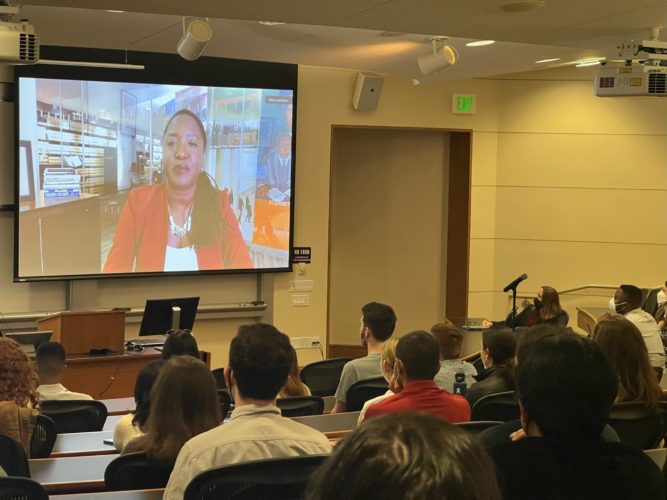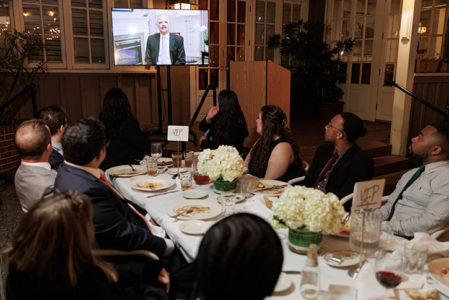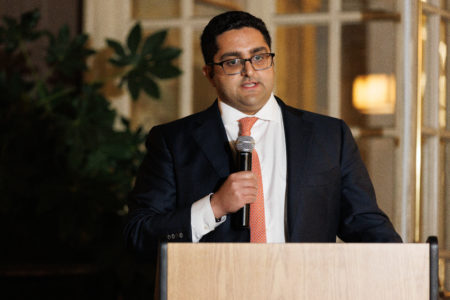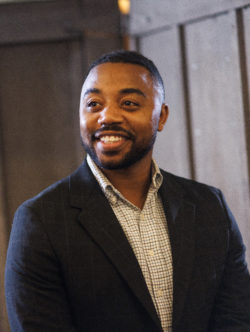Safeguarding the Right to Vote: The 2022 Stanford Law Review Symposium
On Friday, February 11, and Saturday, February 12, Stanford Law School (SLS) held one of its first in-person events after more than 18 months of Zoom meetings: the 2022 Stanford Law Review (SLR) Symposium. The gathering of law students, academics, civil rights experts and many others in a hybrid format, with a combination of classroom and meal gatherings and live streaming video, focused on voting rights and showcased speeches and discussions with leading scholars from across the country.

The symposium, an extension of SLR and a unique opportunity to gather nationally-recognized scholars and experts, is held annually and organized by SLR editors. The symposium editors review the current volume of SLR, accept input by the SLR Board, faculty and outside submissions to select a symposium topic that is timely and robust. Previous topics at SLR symposia include policing, race and power, lawyering in the age of climate change, the independence of the American judicial system and other pressing issues.

“This year, overwhelming consensus supported voting rights to be SLR Volume 74’s symposium,” said Donovan Hicks, J.D. ‘22, the symposium organizer. “Both students and faculty alike recognized the need to provide a platform for a subject matter that is currently under assault. According to the Brennan Center for Justice, in 2021 alone, more than 440 bills were introduced in 49 states with provisions that could restrict voting access.”
The 2022 symposium featured presentations by leading experts in civil liberties and voting rights including Former Attorney General Eric Holder; Incoming President and Director Council for the NAACP Janai Nelson; Co-chair of President Biden’s Commission on Supreme Court Reform Bob Bauer; and Co-founder of the Election Official Defender Network Ben Ginsberg.
The Stanford Law Review
SLR currently stands as one of the most prominent law journals in the world. Through publishing cutting-edge legal scholarship, it has two principal functions: to foster intellectual discourse among the student membership and to contribute to legal scholarship by addressing important legal and social issues.

“The Stanford Law Review was founded in 1948 by veterans–including future Secretary of State Warren Christopher–who had just returned home after fighting in World War II,” said Daniel Khalessi ‘13, J.D. ‘22, Stanford Law Review’s first Muslim and first Iranian-American president. “The founders set out the following mission: ‘to publish a journal of worth to lawyers and to provide an educational experience of value to students.’ Though this mission was bold, Stanford Law School and SLR were far from perfect. Very few women were part of SLR in its early years and students of color were not admitted until decades later. While there is still so much more work to be done, I am excited that SLR is about to mark its 75th year and proud that the journal has become a much more inclusive institution since its founding.”
The Stanford Law Review is operated entirely by Stanford Law School students and is fully independent of faculty and administration review or supervision. Student editors select, edit and publish articles and notes and are trained to critically and comprehensively evaluate submissions. Through a team-editing process, the editors assess each piece’s analysis, writing style, research, organization and accuracy, and work closely with submission authors to improve their work.
In addition, student authors who submit notes for publication receive extensive editorial assistance. Each year, SLR publishes one print volume with six separate issues—published once a month from January through June. These issues contain original scholarship by law review members, other SLS students, professors, judges, practicing attorneys and others.
“The Stanford Law Review–and law journals generally–play an important role in the legal community,” said Khalessi. “Lawyers, judges, clerks, and scholars look to journals like SLR and our peers when seeking new, creative arguments. SLR’s articles are cited by Supreme Court Justices and appellate lawyers. The articles and student notes that we edit and publish can have a real impact.”
A Focus on Voting Rights

“I think the star-studded lineup we were able to cement this year––including both the symposium participants and the authors––was indicative of how important the current fight to safeguard the fundamental right to vote is today,” said Hicks. “And that fight is ongoing. During the week of our symposium, in Merrill v. Milligan, the U.S. Supreme Court stayed an Alabama district court’s 225-page ruling that found that the state’s current congressional map violated Section 2 of the Voting Rights Act. Now, Alabama does not have to draw a new map in time for the 2022 election. Many decried the decision as foreshadowing an even greater weakening of the Voting Rights Act by the Supreme Court.”
Eric Holder
“This conversation is coming at a critical moment because right now we are in the midst of a crisis the likes of which we’ve not seen since the Civil War. It’s a crisis marked by sedition and insurrection, by violence and by hate, and it threatens to end in significant ways our democracy itself. At a time when it can be difficult to see the path forward, we need to embrace the power that we still have and to fight back – not just for ourselves, but for our country. Between onerous voting restrictions and gerrymandered maps, this means training activists and volunteers to give public testimony and to engage their neighborhoods. It means doubling down on our commitment to comprehensive voting rights legislation.”
Janai Nelson
“We are at a crossroads concerning the future of our constitutional democracy, and it is a moment that calls to question whether the abundant promise of our multiracial multi-ethnic democracy will ever come to pass.
The growing assertion of political power among people of color continues to engender backlash, retribution, and violence, as it has predictably and disappointingly throughout this country’s history, even when those reactionary forces threaten the very existence of democracy itself, as they do now.
A trifecta of assaults is what I believe is the most comprehensive, multi-layered, multi-directional threat to the right to vote that we have seen today.”
“The Stanford Law Review Symposium is not just a two-day annual event,” said Hicks. “The symposium also features essays subsequently published in the Stanford Law Review Online––the law review’s digital platform founded in 2011. This year, those essays feature leading voting rights scholars from across the country, including USC Gould School of Law Professor and Vice Dean Franita Tolson, Northwestern Pritzker School of Law Professor Michael Kang, Florida State University College of Law Professor Michael Morley, NYU Law Professor Rick Pildes, NYU Law Professor Samuel Issacharoff, and University of Toronto Faculty of Law Yasmin Dawood.”
“Planning the Symposium was no easy task but we were immensely pleased by the fantastic turnout and impressive discussions,” said Hicks. “My one regret: I wish we could have welcomed Janai Nelson, Eric Holder, Ben Ginsberg, Robert Bauer, and our other fantastic participants to our campus in-person.”
About Stanford Law School
Stanford Law School is one of the nation’s leading institutions for legal scholarship and education. Its alumni are among the most influential decision makers in law, politics, business and high technology. Faculty members argue before the Supreme Court, testify before Congress, produce outstanding legal scholarship and empirical analysis, and contribute regularly to the nation’s press as legal and policy experts. Stanford Law School has established a new model for legal education that provides rigorous interdisciplinary training, hands-on experience, global perspective and focus on public service, spearheading a movement for change.


